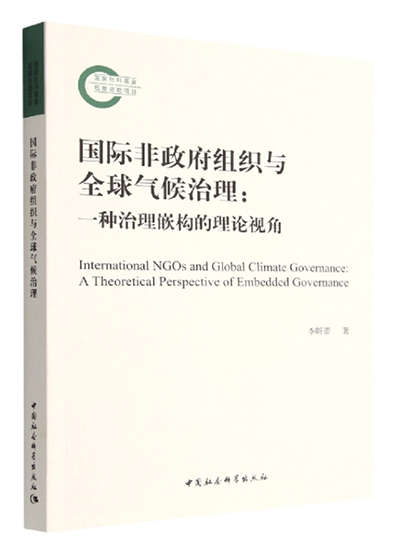A perspective of embedded governance in climate issues

International NGOs and Global Climate Governance: A Theoretical Perspective of Embedded Governance
International NGOs and Global Climate Governance: A Theoretical Perspective of Embedded Governance, by Li Xinlei, a professor from the School of Political Science and Public Administration at Shandong University, proceeds from the theory of embedded governance to comprehensively and systematically identify the role of international non-governmental organizations in global climate governance.
Fragmented governance based on diverse actors and multi-dimensional mechanisms is an inevitable result of the evolution of global climate governance patterns. It also constitutes the fundamental force driving the transformation from the “top-down” Kyoto model to the “bottom-up” Paris model. The fragmentary mechanism of climate governance should be viewed as a complex ecosystem, whose development on some occasions transcends top-down international authoritative regulation. It forms a complex mechanism of climate governance by mutual competition, self-adaptation, and coordination amid bottom-up embedded governance.
The theoretical perspective of embedded governance is also a powerful tool to understand and examine the complex process of global climate governance. It attempts to transcend one-dimensional studies, restoring the complex, diverse evolutionary forms of global climate governance, and showing the formation and positive role of global climate co-governance networks. The author adopts a host of cases to illustrate the networked participation process of international NGOs in the form of embedded governance. Based on realistic case analysis, the last chapter starts from macro analysis to elaborate on the reality of embedded governance for Chinese social organizations participating in global climate governance, suggesting the paths of enhancing participation capacity from the evolution, dilemmas, and challenges the country faces.
After more than 30 years of development, the global climate governance system has formed a compound situation of intricate governance mechanisms and the participation of multiple actors. In terms of participants, apart from international NGOs, there are also governments, cities, knowledge communities, and even individuals with specific influence. From a grand historical perspective, Li systematically analyzes the entire historical evolution of international NGOs’ participation in global climate governance as well as major influence factors therein.
In combination with realistic transitions in the post-Paris era, Li investigates the “process” dimension of climate governance (networked expansion), unraveling the status change of international NGOs’ participation in the field, the mode of networked embedment, and the motivation for increased networking degrees.
Additionally, the author analyzes the sources of authority for international NGOs’ participation in global climate governance from the “structure” dimension of climate governance (authority aggregation).
Li Huiming is a professor from the School of Political Science and Public Administration at Shandong University.
Edited by YANG LANLAN
